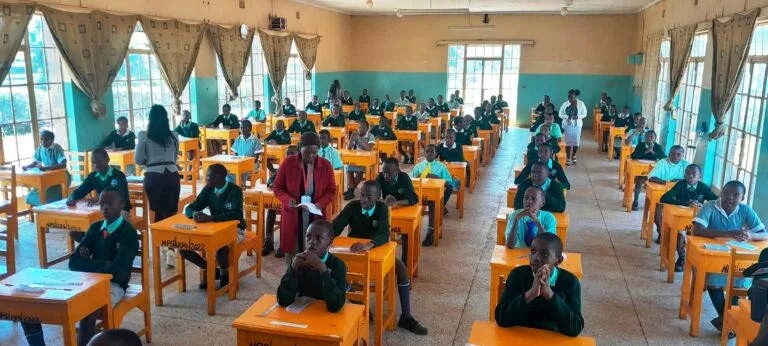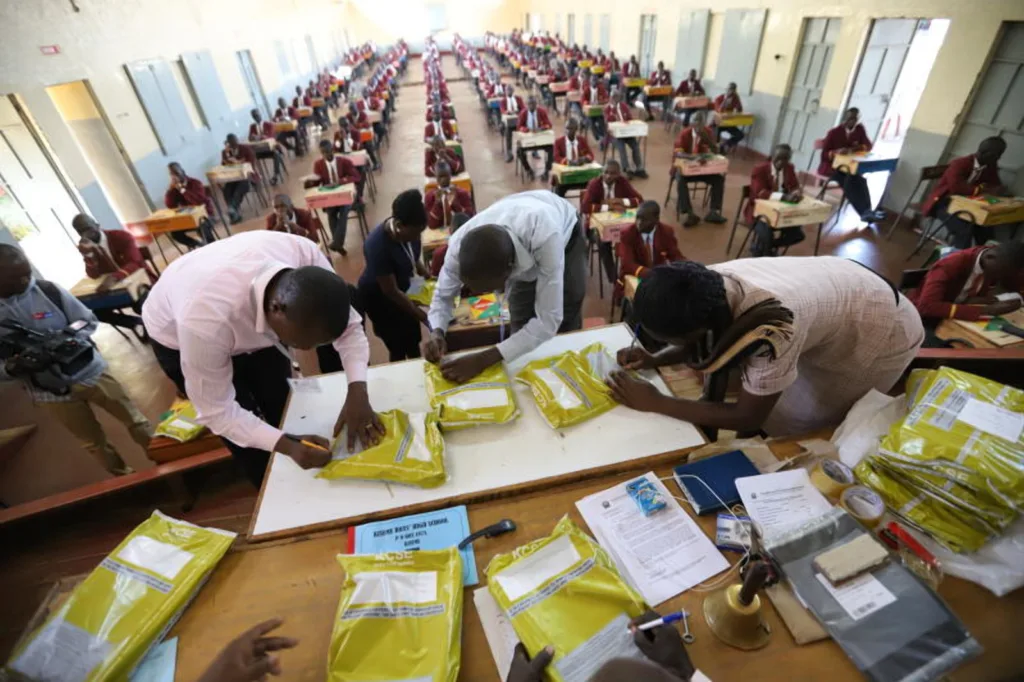KJSEA: What You Should Know About the First-Ever CBC National Exams.
The Kenya National Examinations Council (KNEC) is set to administer the first-ever Kenya Junior Secondary Education Assessment (KJSEA) in 2025.
This marks a significant milestone in the Competency-Based Curriculum (CBC) implementation, as it will assess learners completing Grade 9 and facilitate their transition to senior secondary education.
As Kenya undergoes continuous education reforms, the introduction of KJSEA serves as a critical step in aligning assessments with the skills-based learning model promoted by CBC.
The move has garnered widespread attention from educators, parents, and policymakers, emphasizing the need for all stakeholders to comprehend its structure, purpose, and implications.
Assessment Structure and Grading System
KJSEA is designed to assess learners through both summative and formative approaches. Unlike the Kenya Certificate of Primary Education (KCPE) and Kenya Certificate of Secondary Education (KCSE), which largely focus on end-of-cycle examinations, KJSEA adopts a blended system that incorporates continuous assessments and final examinations.
The assessment will contribute 60% of a learner’s final grade, while the remaining 40% will come from School-Based Assessments (SBAs) conducted in Grades 7 and 8.
This model ensures that learners are not solely evaluated based on a single high-stakes exam but rather on their overall progress and competencies developed over time. This shift aligns with global education assessment trends, promoting a holistic evaluation of students’ knowledge, skills, and attitudes.

Sample Papers and Subject Coverage
The inaugural KJSEA examination is scheduled to begin on October 27, 2025, and conclude on November 6, 2025. Approximately 1.1 million learners nationwide are expected to participate.
To aid preparation, KNEC has made sample papers available through the Competency-Based Assessment (CBA) portal, enabling schools to familiarize themselves with the exam structure and content.
These sample papers provide insights into question formats, marking criteria, and the required competency levels.
The subjects covered include English, Kiswahili, Mathematics, Integrated Science, Agriculture and Nutrition, Social Studies and Life Skills, Religious Education, and Creative Arts and Sports. By making these resources accessible, KNEC ensures standardized preparation efforts across schools, allowing learners, teachers, and parents to understand the examination expectations.
Registration Process and Pilot Study Findings
The registration process for the 2025 KJSEA examination will commence on February 17, 2025. Schools are required to ensure all candidates are correctly registered for their respective subjects, as there will be no opportunity for corrections once the registration window closes.
KNEC has emphasized that any learner registered inaccurately will have to defer their examination to the following year.
To ensure the effectiveness of the assessment, KNEC conducted a pilot study in July 2024 across 235 schools in all 47 counties. The findings from this study have played a crucial role in refining the assessment tools and ensuring the smooth administration of the exam.
This underscores the importance of meticulous planning by school administrators to prevent disruptions that could impact students’ transition to senior secondary education.
The introduction of KJSEA is part of the government’s broader initiative to improve education quality by shifting away from rote learning and encouraging critical thinking, problem-solving, and practical application of knowledge.
The CBC framework, under which KJSEA operates, emphasizes a learner-centered approach where students develop competencies relevant to real-world challenges.
This approach aims to prepare learners for diverse career pathways in senior secondary education, which is structured into three main tracks: Arts and Sports Science, Social Sciences, and Science, Technology, Engineering, and Mathematics (STEM).
By evaluating students based on their ability to apply knowledge in various contexts, KJSEA seeks to bridge the gap between academic learning and practical skills development.

Challenges in Implementation and Stakeholder Concerns
Despite its intended benefits, the implementation of KJSEA has presented several challenges. Teachers and school administrators have expressed concerns about institutional preparedness for the new assessment format. Infrastructure limitations, resource constraints, and teacher training remain key issues that must be addressed to ensure the smooth execution of the assessment.
Additionally, parents and learners have voiced anxieties regarding the transition process, particularly about placement in senior secondary schools.
To address these concerns, the government, through the Ministry of Education and KNEC, has been actively engaging stakeholders in discussions and providing necessary support mechanisms to ensure an effective rollout.
To guarantee the successful execution of KJSEA, various measures have been put in place. The Ministry of Education has initiated training sessions for teachers to equip them with the necessary skills to administer the examination.
Additionally, efforts are underway to enhance digital infrastructure, ensuring the efficient execution of school-based assessments.
KNEC is also collaborating with school administrators to provide guidance on assessment standards, ensuring consistency in the grading system. These initiatives are critical in maintaining the credibility and reliability of the assessment while fostering confidence among all involved stakeholders.
Call for Stakeholder Engagement and Preparation
As the first KJSEA examination approaches, active engagement from learners, teachers, and parents is essential. Schools should integrate sample papers into revision plans, promote collaborative learning, and provide students with the necessary support to enhance their confidence.
Parents should foster conducive home environments for study and reinforce the importance of competency-based learning. Meanwhile, teachers must adopt innovative teaching methodologies that align with CBC principles, ensuring students are adequately prepared for both school-based and national assessments.
Read Also: High Court Awards Ksh.600,000 in Damages to Expelled Makini School Students
Conclusion:
The success of KJSEA will largely depend on its effective implementation and its ability to achieve the intended goal of holistic learner evaluation. As Kenya embarks on this new phase of educational assessment, stakeholders must remain committed to ensuring fairness, inclusivity, and excellence.
By fostering a culture of continuous learning and improvement, KJSEA has the potential to revolutionize Kenya’s education system and better equip students for future opportunities.
With the national examination fast approaching, collaboration among policymakers, educators, students, and parents will be vital in ensuring that KJSEA serves as a transformative tool for academic and professional development.
KJSEA: What You Should Know About the First-Ever CBC National Exams
Follow Teachers Updates on Facebook, LinkedIn, X (Twitter), WhatsApp, Telegram, and Instagram. Get in touch with our editors at [email protected].


Discussion about this post